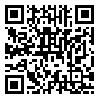BibTeX | RIS | EndNote | Medlars | ProCite | Reference Manager | RefWorks
Send citation to:
URL: http://ijn.iums.ac.ir/article-1-693-en.html
Background and Aim: Exclusive breastfeeding which has been recommended as the best feeding method for infants up to six months has a protective effect against mortality and morbidity. Nevertheless, breastfeeding is not a universal practice and reduction in breastfeeding rate is now considered as a serious problem, especially in developing countries. The aim of this study was to evaluate�the�effect of Kangaroo contact on duration of exclusive breastfeeding and success of first breastfeeding in primiparous women.
Material and Methods: This study is a randomized controlled trial performed in labor and maternity wards of Shahid Akbar-Abadi hospital in Tehran. One hundred healthy primiparous mother-infant dyads were randomly assigned either to Kangaroo contact (n=50) or routine care (n=50). The Infant Breastfeeding Assessment Tool was used to assess success of first breastfeeding and duration of exclusive breastfeeding was evaluated by face to face interview in 4 months post delivery. The authors declare that they have no conflict of interests.
Results: In Kangaroo contact group, 100 percent of babies had a successful first feed compared with 74% in the routine care group. The difference in the success rate was 26%, with 95% confidence interval χ² =14.943 df =1 P ≤ 0.0001. No statistical significant differences was found in duration of exclusive breastfeeding (101.2 ± 27.84 vs 88.7 ± 42.47 P< 0.85) during follow up.
Conclusion: Very early Kangaroo contact enhanced breastfeeding success during the early postpartum period. The difference between the groups in duration of exclusive breastfeeding at 4 months was not statistically significant. Overall, we believe our study provides support for the implementation of Kangaroo contact.
Received: 2009/12/28 | Accepted: 2014/08/25 | Published: 2014/08/25
| Rights and permissions | |
 |
This work is licensed under a Creative Commons Attribution-NonCommercial 4.0 International License. |




